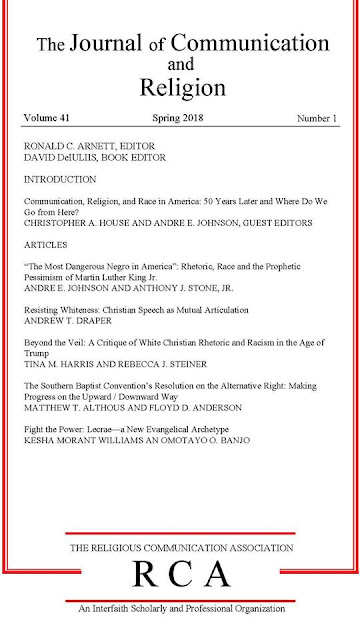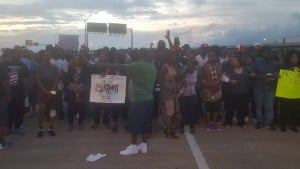I am pleased to announce that the Spring 2018 special issue of the Journal of Communication and Religion is now out. Christopher A. House and I had the pleasure of guest editing this special issue titled, Communication, Religion, and Race in America: 50 Years Later and Where Do We Go from Here? In the first article, “The Most Dangerous Negro in America”: Rhetoric, Race and the Prophetic Pessimism of Martin Luther King Jr., I and my co-author Anthony J. Stone focused our attention on the last twelve months of Martin Luther King’s life and particularly on his rhetoric that addressed systemic racism. In their essay, we argue that King adopted the persona of a pessimistic prophet that consequently marked him as “The Most Dangerous Negro in America.” Rather than inspiring readers to take a sentimental look at King’s life, we attempt to get readers to see King as a radical prophetic voice who unapologetically challenged white supremacy until the very end of his life. Andrew T. Draper’s article, Resisting Whiteness: Christian Speech as Mutual Articulation, raises an important question: is whiteness a theological issue? Contextualized against narratives of a “post-racial” society, Draper provides scholars of communication, race and religion with a framework by which we can further examine how whiteness is socially communicated, performed, and understood as Godtalk. If whiteness is to be examined as a theological issue, the next three articles all then deal with cases studies on the relationship of whiteness, theology, and politics in the era of Donald Trump.
While some have characterized Trump’s behavior and rhetoric as mean-spirited and bigoted, eighty-one percent of white evangelicals supported Trump with their votes. Tina M. Harris and Rebecca Steiner in their essay, Beyond the Veil: A Critique of White Christian Rhetoric and Racism in the Age of Trump, discuss the Christian community’s response to Trump’s election through the lens of race and racialized theology. Specifically, Harris and Steiner interrogate how the overwhelming support of White evangelicals to Trump’s election is best understood through the lens of whiteness. Analogously, Matthew Althouse and Floyd Anderson in their essay, The Southern Baptist Convention’s Resolution on the Alternative Right: Making Progress on the Upward / Downward Way, offer a Burkean analysis of the 2017 Southern Baptist Convention’s (SBC) resolution condemning the “Alt-Right” movement. Althouse and Anderson identify how the SBC’s initial trepidation to condemn the Alt-Right was a costly misstep to their larger efforts at racial healing. Their further analysis of SBC’s revised solution condemning the Alt-Right further illustrates how white SBC members understood and communicated God’s story as part of their story in ways in that elide difference, render the lived experience of SBC members of color invisible, and reinforce white supremacy. The next article, Fight the Power: Lecrae—a New Evangelical Archetype, by Kesha Morant Williams and Omotayo O. Banjo, uses Stewart’s functional approach to the rhetoric of social movements to analyze the recent rhetorical strategies of rapper Lecrae Moore’s challenges to whiteness and white evangelical social and theological investment in whiteness. Williams and Banjo contextualize Moore’s music within an African American rhetorical tradition of truth-telling about America’s racial past and present and the current struggle of meaning-making at the intersection of race and faith in the era of Black Lives Matter and White Supremacist rallies such as that witnessed in Charlottesville, VA. In each of these articles, Harris and Steiner, Draper, Williams and Banjo, and Althouse and Anderson, use their studies to point a way forward in race relations through means of dialogue, confession, acknowledgment, and expressions of suffering, and public redress of individual and systemic racism.
We thank the editor of the Journal, Ron Arnett for his gracious invitation to co-edit this issue.
Donate to the Work of R3
Like the work we do at Rhetoric Race and Religion? Please consider helping us continue to do this work. All donations are tax-deductible through Gifts of Life Ministries/G’Life Outreach, a 501 (3) tax-exempt organization, and our fiscal sponsor. Any donation helps. Just click here to support our work.












